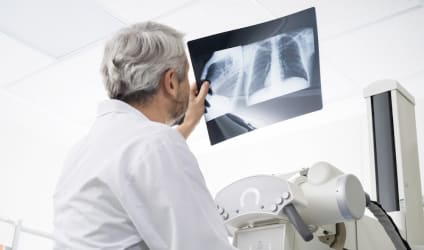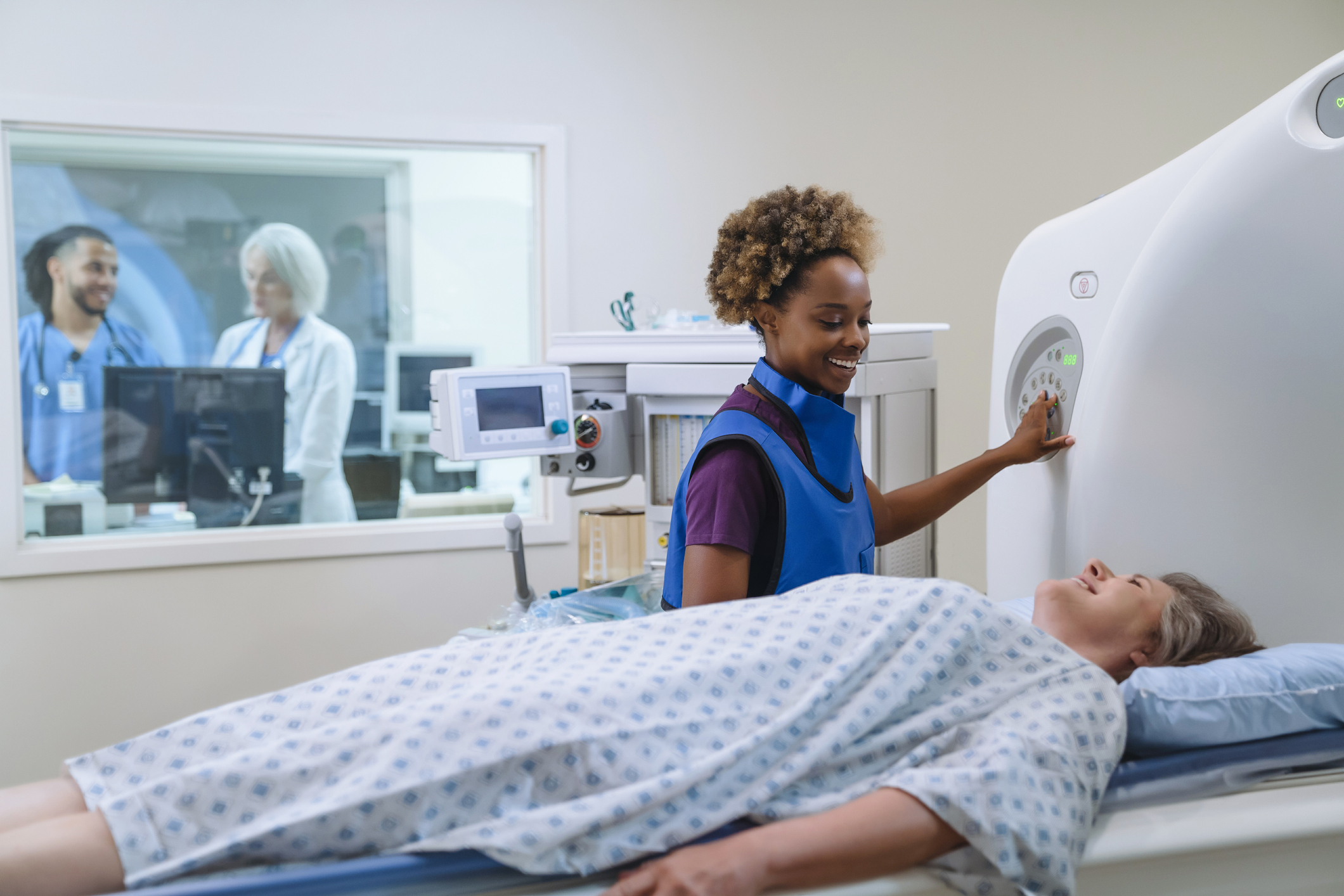Best Master’s in Radiologic Technology Programs
Editor & Writer
Editor & Writer
Editor & Writer
Editor & Writer
www.bestcolleges.com is an advertising-supported site. Featured or trusted partner programs and all school search, finder, or match results are for schools that compensate us. This compensation does not influence our school rankings, resource guides, or other editorially-independent information published on this site.
Turn Your Dreams Into Reality
Take our quiz and we'll do the homework for you! Compare your school matches and apply to your top choice today.
Portions of the following article were drafted using an in-house natural language generation platform. The article was then reviewed, fact-checked, and edited by multiple members of our editorial team prior to publishing.
Whether you're a licensed healthcare professional looking to advance your career or a recent graduate considering a profession in medical imaging, a master's in radiologic technology can be a valuable investment in your future.
This advanced degree offers a combination of theoretical training and practical skills to prepare you for leadership roles in the field, as well as increased earning potential.
However, with the variety of programs available, it's important to do your research to find the best fit for your career goals. We'll highlight the top master's programs in radiologic technology and the benefits of pursuing this degree.
Featured Online Radiologic Technology Programs
Learn about start dates, transferring credits, availability of financial aid, and more by contacting the universities below.
Best Accredited Master's in Radiologic Technology Programs
We use trusted sources like
Peterson's Data
and the National Center for Education Statistics to inform the data for these schools.
BestColleges.com is an advertising-supported site. Featured or trusted partner programs and all school search, finder, or match results are for schools that compensate us. This compensation does not influence our school rankings, resource guides, or other editorially-independent information published on this site.
Browse programs Discover matches Request info
The University of Texas MD Anderson Cancer Center
Houston, TX - 4 years
- Campus
On Campus | Scheduled Classes
Avg. Cost per Credit
In State | $1,600
Out of State | $6,500
Credits to Graduate
30
Program Information
Program Accreditation | Joining Review Committee on Education in Radiologic Technology
The University of Texas MD Anderson Cancer Center is home to a master's in radiologic sciences that individuals use to both expand career options and continue their higher education journey. This program offers three five-semester concentrations, including administrative leadership, educational leadership, and medical imaging informatics.
Standard coursework for this master's program includes topics such as fundamentals of healthcare systems, research methodology, and legal and ethical fundamentals of healthcare.
Applicants must hold a bachelor's degree from an accredited institution and certification from professional organizations such as the American Registry for Diagnostic Medical Sonography (ARDMS) or Nuclear Medicine Technology Certification Board (NMTCB).
MCPHS University
Boston, MA - 4 years
- Online + Campus
100% Online | Self-Paced Classes
Avg. Cost per Credit
In State | $1,325
Out of State | $1,325
Credits to Graduate
30
Program Information
Program Accreditation | Joining Review Committee on Education in Radiologic Technology
Established in 1823, the Massachusetts College of Pharmacy and Health Services (MCPHS) is a public university that offers a master's in radiologic and imaging sciences. This 30-credit program includes two academic tracks — administrative leadership and teaching leadership. Students complete core classes covering topics such as leadership and communication, professional practice trends, and diversity and cultural competencies.
Prospective students must hold a bachelor's degree in a related medical imaging or therapeutic program. Additionally, applicants should have a minimum undergraduate GPA of 2.5 and hold a license to practice in their field.
Loma Linda University
Loma Linda, CA - 4 years
- Online + Campus
100% Online | Self-Paced Classes
Avg. Cost per Academic Year
In State | $30,000
Out of State | $30,000
Units to Graduate
94
Program Information
Program Accreditation | Joint Review Committee on Education in Radiologic Technology
California's Loma Linda University is a private health services institution that offers a 100% online maser's in radiologic technology. In addition to online course requirements, degree-seekers must attend several one-day, on-campus visits. Students can complete their clinical rotations at a clinical site within their state.
Core classes for this online master's include topics such as radiology reporting, pathophysiology, radiology procedures and image evaluation, and fluoroscopy and radiation protection.
Loma Linda applicants must hold a bachelor's degree and provide official transcripts. Additionally, prospective students must hold an active R.T. licensure and current CPR certification. Applicants should also have two years of full-time professional experience.
Midwestern State University
Wichita Falls, TX - 4 years
- Online + Campus
On Campus | Scheduled Classes
Avg. Cost per Credit
In State | $50
Out of State | $472
Credits to Graduate
34-37
Program Information
Program Accreditation | Joint Review Committee on Education in Radiologic Technology
Based in Witchita Falls, Texas, Midwestern State University is a public institution that is home to a master's in radiologic sciences. Designed to prepare students for various leadership, clinical, and education-based roles, degree-seekers complete core classes including research methods, contemporary trends in radiologic sciences, and leadership for change in radiologic sciences.
Prospective students must hold a relevant bachelor's degree from an accredited college or university. Applicants submit their application with official transcripts, a professional resume, and an admission essay answering supplied questions.
Weber State University
Ogden, UT - 4 years
- Online + Campus
On Campus | Scheduled Classes
Avg. Cost per Credit
In State | $542
Out of State | $1,601
Credits to Graduate
62
Program Information
Program Accreditation | Joint Review Committee on Education in Radiologic Technology
Based in Ogden, Utah, Weber State University is a public institution that offers a master's in radiologic sciences. Core classes for this master's track include topics such as clinical laboratory correlation, population health in radiologic sciences, and managing health information. Alongside core classes, students can pursue specializations in areas like MSRS innovation and cardiac specialist.
Prospective students must hold certification to work as radiologic technologists and document at least one year of experience in a clinical setting. Applicants must hold a bachelor's degree from an accredited institution. Weber State favors applicants with undergraduate degrees in relevant health sciences areas.
How We Rank Schools
At BestColleges, we believe a college education is one of the most important investments you can make. We help you navigate the college selection process by offering transparent, inclusive, and relevant school rankings.
We use datasets from trusted sources like the National Center for Education Statistics to inform the data for these schools and our methodologies. This ranking is from 2023. To learn more, check out our full ranking methodologies.
Top Three Benefits of a Radiologic Technology Degree
If you want a healthcare career, a radiologic technology degree brings many benefits. Here are the three key perks:
-
1
Speedy Progression to Professional Life
In comparison with many health-related professions requiring several years of schooling, a career in radiography requires just two years of study. This means you can quickly enter the workforce without needing a four-year degree. -
2
Attractive Salaries
Radiologic technologists make an above-average salary, averaging $76,000 per year, with opportunities to earn more with unique specializations. -
3
Growing Job Market
A growing elderly population is escalating the need for medical imaging services, leading to increased career prospects for radiologic technologists.
What Can I Expect From a Master's in Radiologic Technology Program?
Master's programs in radiologic technology provide a robust education that melds theoretical learning with practical experience via field work. You'll be trained in clinical practices, critical thinking, communication, and problem-solving skills.
You'll also learn about patient positioning, radiation safety measures, non-standard procedures, and assessing and scrutinizing radiographs. All in all, the program should take you about two years to complete, assuming you're studying full time.
What Courses are in a Radiologic Technology Master's Program?
A master's degree in radiologic technology includes higher-level courses that enhance your basic understanding of healthcare procedures and build upon hands-on practice. These courses usually cover:
- Advanced Radiologic Physics: This class focuses on the intricate physics concepts that serve as the backbone of imaging technology.
- Cross-Sectional Anatomy: This course provides an in-depth understanding of anatomy and physiology as seen on CT and MRI scans.
- Radiologic Pathophysiology: In this course, students learn to identify a variety of diseases and conditions as they are presented in medical images.
- Radiologic Administration and Management: This course covers the managerial skills required to oversee a radiology department.
- Research Methods in Radiologic Science: In this class, students delve into the methods of conducting research and understanding scientific literature within the radiologic technology field.
How Much Does a Radiologic Technology Degree Cost?
According to the National Center for Education Statistics, the average tuition at a graduate degree program is $20,513 in the U.S. Make sure to budget for additional expenses, such as books, materials, and living costs.
Make sure to submit your FAFSA and check your school's financial aid office to see if scholarships are available to help you pay for your degree. You can also apply for federal and private student loans.
What Are the Admission Requirements?
To apply to a radiologic technology master's degree program, you'll usually need a bachelor's degree in a related field, active certification, and relevant work experience. Most schools have a minimum GPA requirement.
Additional requirements can include letters of recommendation, a personal statement, GRE scores, and a professional resume. Check with the specific program for exact details since these requirements can vary.
What Can You Do With a Master's in Radiologic Technology Degree?
As a radiologic technologist, you collaborate closely with radiologists and other medical personnel to create top-quality diagnostic images for disease and injury diagnosis. You can become a radiologic technologist with just a master's degree, but completing a master's program can boost your chances of securing leadership or educational roles within the field.
Earning a master's degree also paves the way for you to explore advanced roles, like becoming a specialist in sonography, computed tomography, mammography, or nuclear medicine. This degree is also ideal for those already working in healthcare looking for a career change.
| Career | Median Annual Salary (2023) |
|---|---|
| Radiologic Technologist | $76,020 |
| Medical Physicist | $166,160* |
| Postsecondary Teacher | $84,380 |
| Career and Technical Education Teacher | $63,580 |
*Payscale data from March 2024
Radiologic Technology Licensing and Certification Requirements
If you're aiming to become a radiologic technologist, you'll typically need licensure from the American Registry of Radiologic Technologists (ARRT). To get your license, you'll need to complete an associate degree and an ARRT-approved educational program. You'll then need to pass an exam.
ARRT provides 15 credentialing options for aspiring radiologic technologists, and the educational requirements may differ for each one. Radiologic technologists must maintain their credentials each year by completing continuing education requirements.
Should I Get a Master's in Radiologic Technology?
You should get a master's in radiologic technology if you're already working as a licensed radiologic technologist and looking for advanced roles or if you're working in another healthcare role and looking to change careers.
A master's in radiologic technology can be a great investment for working healthcare professionals with licensure in the field. The BLS projects that jobs for radiologic and MRI technologists will grow by 9% between 2020 and 2030. And, according to Payscale, professionals with a master's in radiology earn an average annual salary of $94,000.
Frequently Asked Questions About Radiologic Technology Programs
What is ARRT certification?
ARRT certification is one of the requirements for those looking to work in radiologic technology. ARRT conducts examinations for state licensing in radiography, nuclear medicine technology, radiation therapy, and other medical imaging disciplines.
How long would it take to get a master's in radiology?
It typically takes two years to complete a master's in radiology if you're studying full time. However, you might take more or less time if you're studying part time, taking online classes, or completing an accelerated program.
What is the highest degree in radiologic technology?
The highest degree in radiologic technology is a doctor of medicine (MD) in radiology for those looking to practice medicine or a Ph.D. in radiology for those interested in medical imaging research. An MD could take 6-8 years to complete, plus residency requirements, while a Ph.D. could take 3-5 years to complete.
What is the highest-paying field in radiology?
Interventional radiology is the highest-paying field within radiology, with an average annual salary of $311,870 for an interventional radiologist, according to Payscale.






